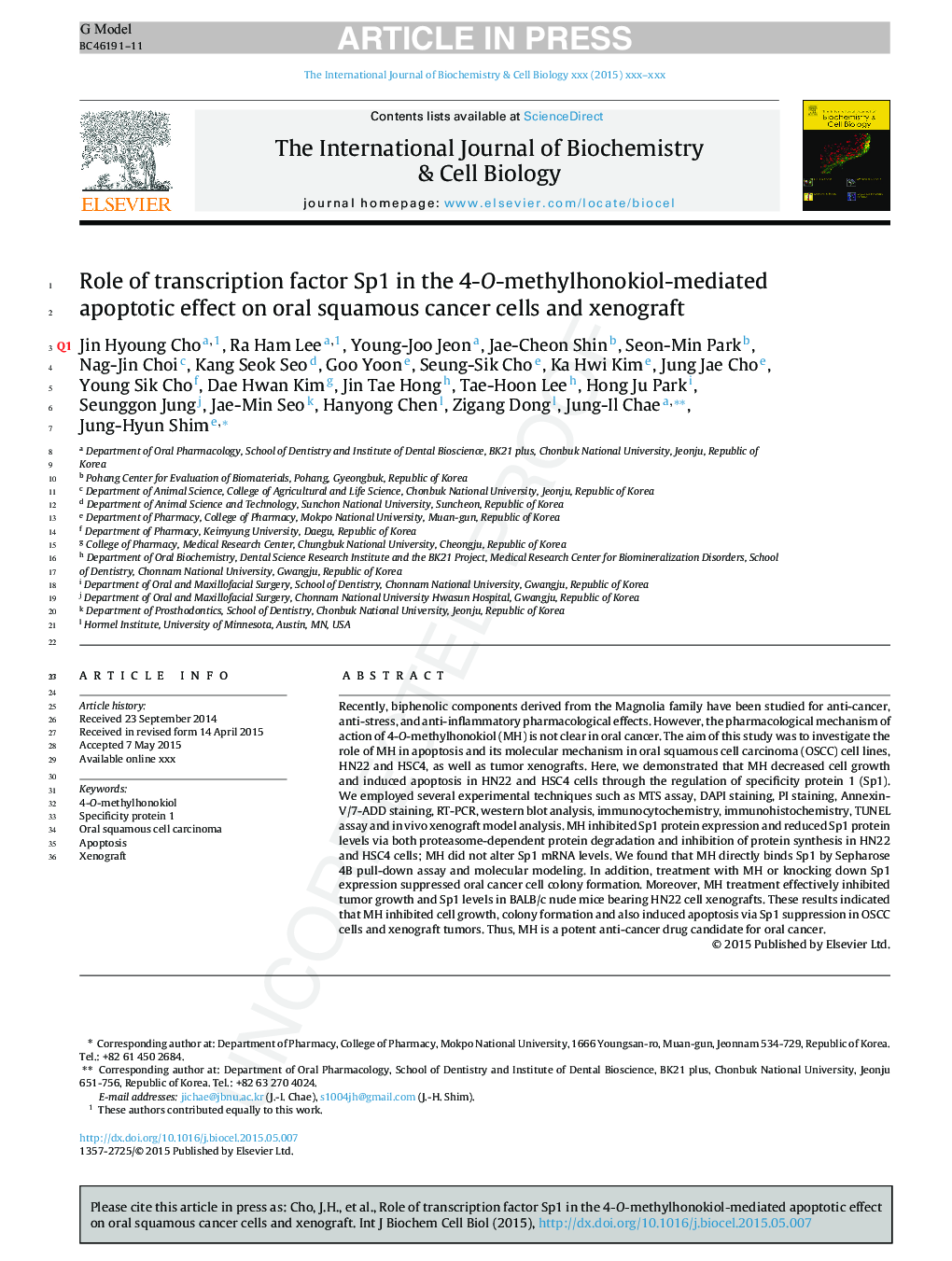| کد مقاله | کد نشریه | سال انتشار | مقاله انگلیسی | نسخه تمام متن |
|---|---|---|---|---|
| 8322692 | 1539880 | 2015 | 11 صفحه PDF | دانلود رایگان |
عنوان انگلیسی مقاله ISI
Role of transcription factor Sp1 in the 4-O-methylhonokiol-mediated apoptotic effect on oral squamous cancer cells and xenograft
دانلود مقاله + سفارش ترجمه
دانلود مقاله ISI انگلیسی
رایگان برای ایرانیان
کلمات کلیدی
موضوعات مرتبط
علوم زیستی و بیوفناوری
بیوشیمی، ژنتیک و زیست شناسی مولکولی
زیست شیمی
پیش نمایش صفحه اول مقاله

چکیده انگلیسی
Recently, biphenolic components derived from the Magnolia family have been studied for anti-cancer, anti-stress, and anti-inflammatory pharmacological effects. However, the pharmacological mechanism of action of 4-O-methylhonokiol (MH) is not clear in oral cancer. The aim of this study was to investigate the role of MH in apoptosis and its molecular mechanism in oral squamous cell carcinoma (OSCC) cell lines, HN22 and HSC4, as well as tumor xenografts. Here, we demonstrated that MH decreased cell growth and induced apoptosis in HN22 and HSC4 cells through the regulation of specificity protein 1 (Sp1). We employed several experimental techniques such as MTS assay, DAPI staining, PI staining, Annexin-V/7-ADD staining, RT-PCR, western blot analysis, immunocytochemistry, immunohistochemistry, TUNEL assay and in vivo xenograft model analysis. MH inhibited Sp1 protein expression and reduced Sp1 protein levels via both proteasome-dependent protein degradation and inhibition of protein synthesis in HN22 and HSC4 cells; MH did not alter Sp1 mRNA levels. We found that MH directly binds Sp1 by Sepharose 4B pull-down assay and molecular modeling. In addition, treatment with MH or knocking down Sp1 expression suppressed oral cancer cell colony formation. Moreover, MH treatment effectively inhibited tumor growth and Sp1 levels in BALB/c nude mice bearing HN22 cell xenografts. These results indicated that MH inhibited cell growth, colony formation and also induced apoptosis via Sp1 suppression in OSCC cells and xenograft tumors. Thus, MH is a potent anti-cancer drug candidate for oral cancer.
ناشر
Database: Elsevier - ScienceDirect (ساینس دایرکت)
Journal: The International Journal of Biochemistry & Cell Biology - Volume 64, July 2015, Pages 287-297
Journal: The International Journal of Biochemistry & Cell Biology - Volume 64, July 2015, Pages 287-297
نویسندگان
Jin Hyoung Cho, Ra Ham Lee, Young-Joo Jeon, Jae-Cheon Shin, Seon-Min Park, Nag-Jin Choi, Kang Seok Seo, Goo Yoon, Seung-Sik Cho, Ka Hwi Kim, Jung Jae Cho, Young Sik Cho, Dae Hwan Kim, Jin Tae Hong, Tae-Hoon Lee, Hong Ju Park, Seunggon Jung, Jae-Min Seo,